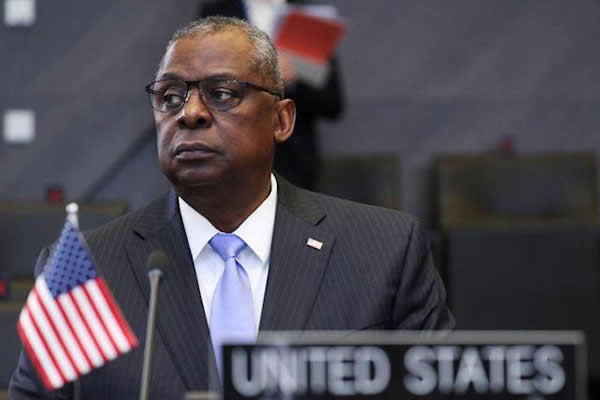
U.S. Secretary of Defense Lloyd Austin spoke to his Russian counterpart Wednesday concerning a Russian military intercept that resulted in the downing of a U.S. surveillance drone Tuesday over the Black Sea.
“The United States will continue to fly and to operate wherever international law allows, and it is incumbent upon Russia to operate its military aircraft in a safe and professional manner,” Austin told reporters after announcing that he had “just got off the phone” with Russian Defense Minister Sergei Shoigu.
It was the first call between the two defense leaders since October, according to officials.
The downed U.S. MQ-9 drone was “conducting routine operations” in international airspace Tuesday, according to the U.S. military, when a pair of Russian Sukhoi Su-27 fighter aircraft “dumped fuel on and flew in front of the MQ-9.”
The military said one of the jets struck the U.S. drone’s propeller, causing U.S. forces to bring down the drone in international waters.
“We know that the intercept was intentional. We know that the aggressive behavior was intentional. We also know it is very unprofessional and very unsafe,” General Mark Milley, chairman of the Joint Chiefs of Staff, told reporters Wednesday.
Milley said he was “not sure yet” whether the physical contact between the Russian aircraft and the drone was intentional.
Milley also said the U.S. has video evidence that shows the aggressive intercept. He also spoke with his Russian counterpart by phone later Wednesday about “several security-related issues of concern,” according to his spokesman.
Russia said it is considering whether to try to retrieve the drone, but U.S. officials said its operatives were able to remotely erase sensitive software on the drone to prevent Russia from collecting secret information before sending the aircraft into the Black Sea.
The U.S. does not have ships in the Black Sea, which is largely controlled by Russia.
“But we do have a lot of allies and friends in the area, and we’ll work through recovery operations. That’s U.S. property,” Milley said.
Russia denied that its Su-27 jets came into contact with the U.S. drone and pinned blame for the crash on the operation of the drone. A U.S. military official told VOA the unmanned MQ-9 has not yet been recovered. State Department spokesperson Ned Price said Tuesday the United States summoned the Russian ambassador to protest the incident.
The Russian Defense Ministry Telegram channel reported Wednesday that Shoigu has blamed the incident on the United States’ “non-compliance with the restricted flight zone declared by the Russian Federation, which was established as part of a special military operation.”
Earlier Wednesday, Austin and Milley hosted the 10th meeting of the Ukraine Defense Contact Group more than a year after Russia launched its full-scale invasion of Ukraine.
The virtual meeting included 51 participants. Milley said the group promised “a broad mix of air defense systems,” in addition to providing more artillery, armor and ammunition. For example, Sweden will provide 10 more Leopard tanks to Ukraine, and Norway will partner with the United States to provide two additional National Advanced Surface-to-Air Missile Systems, or NASAMS.
“Ukraine matters. It matters not to just Ukraine or to the United States, it matters to the world. This is about the rules-based international order,” Austin told reporters Wednesday.
“Russia is running out of capability and out of friends,” he said. “Putin still hopes he can wear down Ukraine and wait us out, so we can’t let up, and we won’t.”
Ukrainian President Volodymyr Zelenskyy said in his nightly address Tuesday that Kyiv was “constantly considering the supply of ammunition and weapons.”
Zelenskyy said the main focus was on efforts to defend the eastern front line, including the Bakhmut area, the scene of months of fierce fighting.























